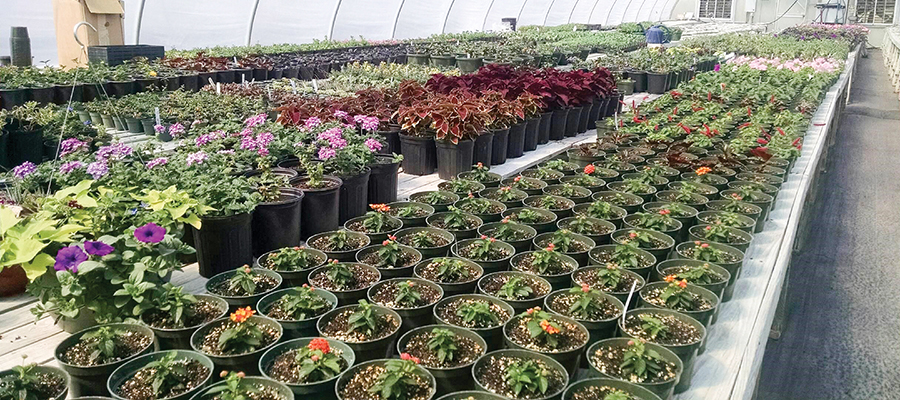The Guilford County Sheriff’s Department’s large greenhouses at the Guilford County Prison Farm near Gibsonville have been unused for several years, but a new hydroponic farming program for troubled youths will breathe new life into those greenhouses.
Up until about three years ago, the Sheriff’s Department used inmate labor to grow plants at the greenhouses to sell to the public. The new program will bring plants and people back into two of those four now-dormant greenhouses.
Guilford County has entered into a contract with BEST (Brothers Excelling with Self-sufficiency to Thrive), a non-denominational 501(c)(3) organization that uses Bible-based principals to mentor young men in Greensboro and help shape their character. The teens and young adults will grow food using hydroponic farming in the program meant to also provide life lessons to the young men who live in troubled parts of Greensboro.
The program is also designed to teach healthy eating practices to families and provide produce to some areas of the city that don’t have easy access to fresh produce.
Hydroponics is a modern farming method that uses mineral-rich water rather than soil to grow the plants. To begin, about 20 youths and 15 mentors will take part in what is a totally new type of program for BEST. The group will get some help from advisors from the Cooperative Extension Program at NC A&T State University and BEST has also applied for grant money from the US Department of Agriculture (USDA) under the Food Safety Outreach Program. The USDA hasn’t officially announced winners and amounts for those awards; however, awards in the “Pilot Program” category can be up to $50,000 according to the application information.
Participants will be from areas of the city that experience a lot of crime, violence and high poverty rates. Some of the boys and young men in BEST programs have been in trouble with the law and were referred to BEST by the Greensboro Police Department.
According to the group’s promotional materials, BEST “identifies, attacks, and destroys problems, and the issues that surface from problems, that plague our young men of color, while developing the total man.” It also states that BEST “acknowledges that we, as a people, and the society as a whole, have ‘dropped the ball’ with respect to ensuring the success and well-being of our young men.”
BEST Executive Director Voulynne Small said she’s very excited about the program now getting underway with the county’s blessing.
“We’ll be growing fresh fruits and vegetables,” Small said.
In addition to teaching work skills and life skills to the youths, the program will also work with the participants’ families to teach “food safety from seeding to table.”
Small said this program will expand the horizons of BEST.
“This is kind of a new adventure for a lot of us,” she said of the hydroponic farming method that has been gaining popularity in recent decades.
Small said Guilford County has a problem with “food deserts” and this program will also help raise awareness of that issue.
She said the idea for using the greenhouses got its start with a conversation about the Prison Farm.
“I have a friend who lives in Gibsonville and she pointed out that they [the greenhouses] were not being used,” Small said. “They just sat their dormant. And we thought this would be a win-win.”
Guilford County’s Prison Farm, which is 806 acres of land in Guilford and Alamance counties, was established in 1935.
This isn’t the first time the Prison Farm will be used for the dual purpose of growing produce and putting people on the right path: For decades, the Guilford County Sheriff’s Department used the facilities and surrounding farmland to teach skills for future employment to inmates who were incarcerated for non-violent offences and serving terms that weren’t long enough to get them sent off to state prison. The former Prison Farm, which had about 120 beds for inmates, was also used to house “weekenders” – convicts, often in for DUI convictions, who were allowed to serve their sentences on weekends so they could keep their jobs.
The Guilford County Board of Commissioners, to the chagrin of Sheriff BJ Barnes, closed down the Prison Farm about three years ago and then began leasing out that land to farmers.
Guilford County Facilities, Parks and Property Management Director Robert McNiece said Guilford County has been looking for ways to use the Prison Farm facilities and he said this certainly seems like a positive venture that makes good use of the greenhouses.
“The county is very excited about this program,” McNiece said.
For decades, the greenhouses were a favorite place for residents in northeast Guilford County to buy plants. Customers would also purchase garden decorations and outdoor furniture there made with inmate labor.
Chairman of the Guilford County Board of Commissioners Jeff Phillips said he hopes the new hydroponics program is a success.
“It looked like a really good purpose for some of the property we haven’t been using,” Phillips said.
The current contract runs for one year. BEST will pay the county $100 a month to use the greenhouses. Under the terms of the contract, BEST agrees to maintain the property, use it only for the stated purposes, follow environmental laws and pay the cost of the propane needed for the program.

